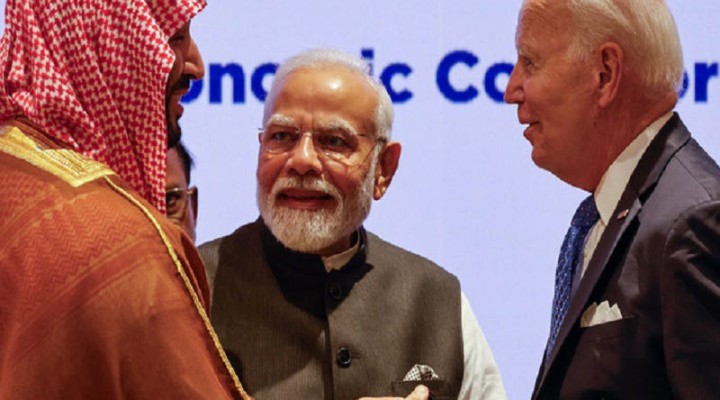Biden’s new Middle East ‘corridor’

The US is trying to groom India into becoming another Israel
The great success announced at the G-20 summit held in New Delhi at the weekend was the creation of an ‘economic corridor’ to supposedly link India to Europe via the Middle East. This is intended to be the centrepiece of a new economic partnership aimed at strangling the BRICS group at birth, boosting normalisation between Israel and most of the Gulf states, side-lining the Suez Canal as a global passageway for east-west trade, and undermining China’s Global Development (‘Belt and Road’) Initiative.
This proposal, agreed in advance by the US and its old and new allies, was conceived as an attempt to shore up its waning global leadership, impede the rise of China in every sphere, and create a broad new front against Russia in the Ukraine war.
The absence of the Chinese and Russian presidents from the G-20 summit was deliberate. Their attendance would have amounted to acknowledging the US’ global leadership status which has eroded in favour of China and Russia in recent years, as well as endorsing Biden for a second term.
The exclusion of Iraq, Syria, Egypt, Turkey, and Iran from this ‘corridor’ was also deliberate. These countries are all close to Russia and China and have a history of hostility to the West due to its imperial legacy. But what sense does it make to exclude them while putting Israel, which is smaller than a single Egyptian, Turkish, or Iraqi province, at the heart of this project — and at a time when it is being ruled by the world’s most extreme and racist government?
Biden described the agreement to create the ‘corridor’ as a game-changer, which would establish rail links connecting maritime ports to facilitate trade and support efforts to develop clean energy. What he did not spell out was that it would also coronate Israel as leader of the Middle East and help it out of its current and future crises.
Benjamin Netanyahu could not conceal his joy at the magnificent achievement Biden secured for him.
“Israel is at the focus of an unprecedented international project that will link infrastructure from Asia to Europe. This link will also realise a multi-year vision that will change the face of the Middle East, and Israel, and will affect the entire world,” he gushed. “This vision starts in India, passes through the United Arab Emirates (UAE), Saudi Arabia, Jordan and Israel before reaching Europe.”
India looks like it is being groomed to become the US’ major tool in confronting Russia and China. In the next few years it could, with Europe’s blessing, be placed on a par with Israel as a proxy to control the Gulf and Middle East regions, as well as sabotaging the BRICS grouping.
That really would be a game-changer. It would signify the eastward expansion of NATO in political, economic, and maybe military terms too. The scale of trade between India and Europe does not on its own warrant the massive expenditure required to build this ‘corridor’ ostensibly designed to facilitate it.
Turkish President Recep Tayyip Erdogan, who was side-lined at the G-20 summit, remarked after he returned home that the best route for channelling trade between India and Europe would be via Turkey. Perhaps it is his belated appreciation of the serious consequences of this project that prompted his friendly meeting with Egypt’s Abdel-Fattah as-Sisi.
Turkey and Egypt are both threatened by this project and the broader political-economic alliance it heralds — as are many other states in the region and the Palestinian people. Egypt earns more than ten billion dollars annually from the Suez Canal, and would lose a fifth of its national income if it were by-passed.
The late Egyptian resident Gamal Abdel Nasser cultivated India as a strategic ally of the Arabs against Western colonialist schemes. His successors neglected it, and their appeasement of Israel turned it into a friend of the occupier state.
But I doubt China and Russia, and all the other countries targeted by this scheme, will sit idly by and fail to react to confront it.
https://www.raialyoum.com/bidens-new-middle-east-corridor/
 TheAltWorld
TheAltWorld 
0 thoughts on “Biden’s new Middle East ‘corridor’”